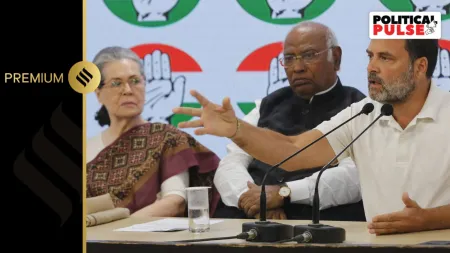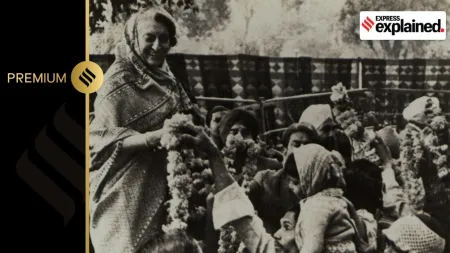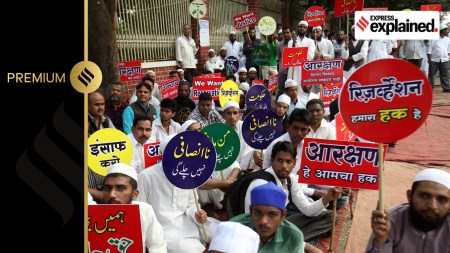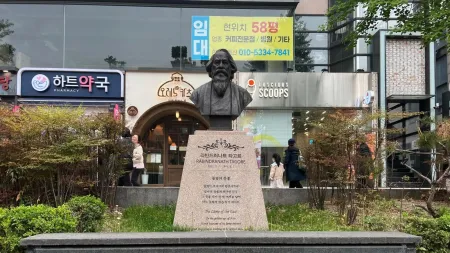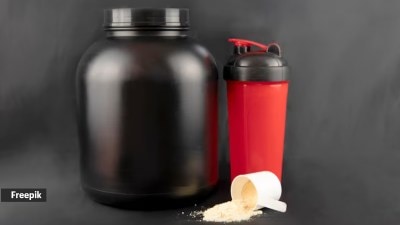- India
- International
‘We are not done with this pandemic until everyone is vaccinated’: Dr Shriram Nene
"It's been heartbreaking for all of us. But this has been a lesson in how people came together regardless of what country they are from and what they did. India handled it fairly well, overall," said Dr Shriram Nene
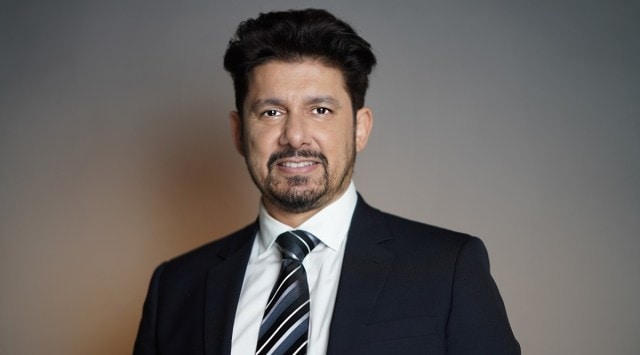 The pandemic has been heartbreaking worldwide, as well as India. But it was a lesson in how people came together regardless of what country they are from to help each other, said Dr Nene. (Photo: PR handout)
The pandemic has been heartbreaking worldwide, as well as India. But it was a lesson in how people came together regardless of what country they are from to help each other, said Dr Nene. (Photo: PR handout)Dr Shriram Nene, a cardiothoracic surgeon, recently launched his YouTube channel to talk about various health issues. One of the videos, ‘Truth about Covid-19 masks’, talks about various masks and their efficacy. The healthcare innovator, who is married to actor Madhuri Dixit, also keeps sharing informative health snippets on his social media handles.
In an exclusive interaction with indianexpress.com, Dr Nene talks about the pandemic, how India handled the crisis, what heart patients and people with comorbidities need to keep in mind, and how the pandemic has been a learning experience for all.
Excerpts:
Currently, the country is battling the second wave of the pandemic which emerged after a short period of semi-normalcy. How do you think we reached this stage?
Four conditions collided to bring us to this point. Up until I would say February-March, we had a period of about four months where the number of cases had gone down significantly and I think most of us were lowered into a false sense of security. The writing was on the walls, but the bigger issue was that we didn’t have vaccines and so people were not getting the necessary immunity. Then, coupled with that, we had a situation with people getting very casual with a lack of masks, a lot of big congregation like Kumbh Mela, election campaigns and rallies, and other things. And the last part of the equation was the fact that we had numerous variants which were far more contagious. One thing led to another and the cases started going up initially in Maharashtra, and in Delhi, and subsequently, all over the country.
View this post on Instagram
What are the main points of concern one needs to take note of at the moment?
Clearly, in the initial phases, there was a lack of infrastructure because we weren’t really prepared for the second wave at all. As a result, we did not have hospital or ICU beds or even adequate ventilators, or oxygen, and basic medications were running out. So we really needed to turn to our allies in the West and other places to scale that up. At the same time, a lot of the biologicals which were being used are not capable of being stored. So if there is no demand for them they don’t keep ready stores and that’s part of the reason why we ran out of some of the treatments for it. The main thing at this point is we need to stay safe, stay home, use standard masking precautions and maintain our vigilance. The cases have started to decline in many parts of the country, and while the mortality will lag and eventually decline, we are still not out of harm’s way because we have still not regulated the vaccine equation. Eventually we will, but it could take us as long as December before everyone is vaccinated.

You recently started your healthcare channel where you shared a video on masks. Could you sum up the various masks and their importance/efficacy?
There are a number of masks, and there is good data on how they work. The current guidelines recommend you wear a double mask in case of a cloth mask, or an N95 which is well-fitted, and potentially a cloth mask over that. Mask type range from simple one-ply cloth which gives you very little protection — can be 5-30 per cent — from droplets going out and even coming in, to N100 or N97 masks. Then there are the N95 (which protects public and user) that healthcare workers use. In between those are the cloth masks which can vary depending on the type of coatings, and they can be effective anywhere from 40-70 per cent if worn two. Remember, masks are critical components as this is an airborne disease and works from droplets and microdroplets. But the point of wearing a mask is you doing your civic duty and not spreading germs. So it’s critical we continue to do this until everyone is vaccinated or has had the disease and is immune.
Since coronavirus is said to be airborne, would you recommend double masking, even inside the house?
Double masking is the way to go when you have to go outside or using a well-fitted N95 with no breaches. But if you don’t have any active Covid cases in your home and neither have any breaches from outside, the likelihood of wearing a mask at home is probably not indicated. But there are exceptions to this rule — if you have people coming from outside into your home, you should certainly wear it at that point. Alternatively, if you go come home after stepping out, you will need to wear the mask until you step foot inside and then close the door. Also, adequate ventilation, in the way of fresh air, helps.
People with comorbidities are advised to be extra cautious. Could you tell us how the virus affects people with heart ailments and what they should keep in mind?
Patients with heart ailments, in particular, those with valvular disease, pulmonary hypertension, and coronary artery disease are at a higher risk of contracting the disease. Further, should they end up with a hyperinflammatory state, as often happens as in the latter part of covid-19, then that would increase the oxygen demand and their heart may not be able to supply it. Given that mismatch, they may end up with a heart attack. Also, when covid-19 is in a very hyperinflammatory stage, you can get clotting disorders with disseminated intravascular coagulation and those clots can lead to other issues. So the take-homes are that people with heart disease have independent comorbidity for getting sicker with covid, which may further worsen their condition. So, people with comorbidities need to be extra cautious.
View this post on Instagram
Could you suggest some simple ways to keep the heart healthy? And some warning signs one ought to be aware of?
If you know you have a family or medical history of heart diseases then you need to take precautions. People experiencing the standard warning signs like chest pain, chest pressure, shortness of breath radiating to your arm, or other symptoms should definitely get evaluated. The worst thing you can do is delay proper evaluation because time is muscle in case of heart disease.
As far as keeping the heart healthy, it goes back to preventative steps like eating right, exercising, making sure medicines are adequately adjusted, and seeing physicians regularly. If you don’t have heart disease but have a history of risk factors like high blood pressure, diabetes, obesity, or high cholesterol, then these are things you can correct in the short term.
How can Covid be managed at home? Any tips for caregivers?
The National Institutes of Health consensus statement has stated Covid can be managed at home when it is in its mild to moderate format. What that means is that Covid has a myriad of symptoms which include fever, chills, sweats, nausea, vomiting, diarrhea, loss of sense of smell, and taste. In stages when these are the only symptoms or you have a self-limited fever and no other symptoms, it can be managed at home with over-the-counter remedies.
But the critical tips are that when someone gets Covid, you need to test trace and everyone who has been in contact with the patient. Secondarily, if that’s the only person with Covid at home, there’s a chance others have been exposed, you will have to quarantine people or isolate that person and watch the symptoms in others. But when one needs to go to the hospital is when your oxygen saturation is less than 94 per cent persistently, if you have profound shortness or shortness of breath at all, or have fevers that do not go down in seven days or go down initially and then come back later, if your respiratory rate is greater than 24 and if after the six-minute walk test you have four points dropped in your saturation. All of these indicate you have severe Covid and that you need hospital care.
View this post on Instagram
There have been various incidences of doctors treating Covid by prescribing steroids at the start, while many others opting for symptomatic treatment. What, according to you, is the approach?
The consensus guidelines suggest steroids should not be used in mild-to-moderate cases. Only if the patient is having a drop in their stats and has severe disease, consider using steroids. In addition, if their D-dimer is up they may need blood thinners. Let’s face it, steroids are a double-edged sword; they are powerful in suppressing the immune face of Covid-19. What we understand about the disease is that the first seven days are a viral-induced state where the virus is replicating and you are getting sick. The next seven days appear to be mediated by your own immune system and that’s where the steroids are targeted. But we should not be treating people with mild-to-moderate disease with steroids. We need to make it targeted, as the downside to steroids is that they do block your immune system and can lead to opportunistic diseases like fungus.
The pandemic has been a huge lesson for everyone. How has it been for you and your family?
It’s been heartbreaking for all of us; we have faced a very difficult time. But this has been a lesson in how people came together regardless of what country they are from and what they did. India handled it fairly well, overall. In the first wave, there were six degrees of separation but in the second, not one of us has been spared of a family member, friend, co-worker, or someone in our neighbourhood who either got sick or passed on. I think this is a history and life-changing time for many of us. I can’t even think how kids are dealing with this owing to the fact it’s just one constant screenplay and not being able to go out. But even for the rest of us and our mental health, it is difficult and all of us are trying to do our best by supporting each other. At all the same time, there are silver linings — the family has been brought together in one place and got to really spend more time with each other.
View this post on Instagram
The pandemic has forced doctors and patients to rely on digital mediums to communicate. Do you think it also has a negative psychological impact on patients because meeting their doctor may have a positive effect on the mind?
It’s a great question, but I think the negative psychological effect of the digital medium is overweighed by the fact that they get access to doctors. There are way too many patients and way too few doctors to administer care to them. I would say telemedicine has been scaled significantly and now patients can actually get access to qualified doctors. There is definitely something to be said about the human touch but I would say as busy as healthcare workers are right now, it’s been challenging. So, digital and telemedicine are here to stay and they have to be scaled up in order to get to more people because there are a lot of people without access to world-class evidence-based knowledge. I see this as a turning point to better medical care.
Secondly, the whole situation with social isolation has been a major problem for all of us. Also, we have been at this for a year, and the pandemic fatigue is real. I don’t think we can really worry as much as to learn from these things, because I don’t think we are done with this pandemic until everyone is vaccinated, which is estimated until December. So we all need to be cautious.
More Lifestyle
May 10: Latest News
- 01
- 02
- 03
- 04
- 05


